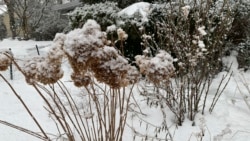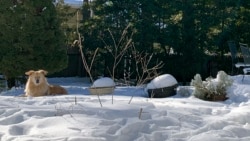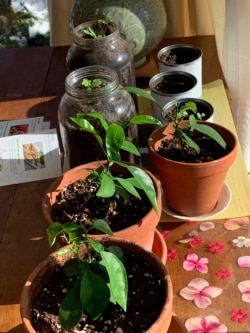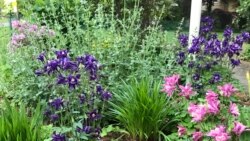From VOA Learning English, this is the Health & Lifestyle report.
Last year, many people across the world looked to their gardens to find enjoyment and peace during the coronavirus pandemic.
Gardens were established in communities and homes with vegetables, flowers and many other different kinds of plants.
Stores that sell gardening equipment and supplies experienced shortages. Millions of people found happiness, release and a sense of safety outdoors with their hands in the dirt.
To many, the spring and summer of 2020 might seem like a very long time ago. And much of the gardening activity stopped once winter set in.
But as we look forward to a new spring and the hope that COVID-19 vaccines will bring lasting change, gardening offers another promise of light.
Katherine S. White, an American writer (and active gardener) once described three kinds of gardens that can fill our time during the winter months. White identified the three in a piece for The New Yorker: “the garden outdoors, the garden of pots and bowls in the house, and the garden of the mind’s eye.”
Here is a look at some possible ways to enjoy these three kinds of gardening.
The garden outdoors
To the eye, there is little in a winter garden that can compare to spring and summer’s active life and colorful growth. Only the most serious gardeners (or those in warmer climates) can keep the growing going outside. This often involves building protective materials around plants to help them survive the cold.
But there are smaller joys to be had. The trees’ empty branches can create beautiful silhouettes, and better views of birds and sunsets. Landscape photographer Larry Lederman, author of the recent book “Garden Portraits,” suggests getting to know your garden better in the winter, when “everything is bare and you can see the bones” of the land.
Gardens can also remind us that winter is just one stop on the path to other seasons. Death is everywhere in a garden, all year round, but it makes rebirth possible. A lot of plants keep going.
Winter can also be a good time to reexamine your own personal battles against climate change. We can start or continue composting. And we can research services, products and methods to help make next year’s garden more sustainable.
The garden indoors
Houseplants are hot now and social media is full of plant photos.
New technologies make it easier to grow plants anywhere indoors, with or without soil. The plants offer not only beauty, but the rewards of caring for living things and seeing them grow.
Indoor vegetable gardening, too, has become especially popular both as a food source and as a family activity. For example, small, contained gardens can be bought and placed next to the window. Mushrooms can be grown in a cardboard box or tomatoes can easily be grown in a bottle.
A rise in indoor gardening has driven up sales for greenhouses, growing lights and seeds. One seed company in the northeastern state of Maine, Johnny’s Selected Seeds, recently suspended orders from home gardeners temporarily. It said that because of COVID-19, the large number of orders it was receiving could not be effectively filled.
The garden of the mind’s eye
The garden of the mind’s eye is the one we imagine and plan.
Author and gardener Jamaica Kincaid once said: “I shall never have the garden I have in my mind, but that for me is the joy of it; certain things can never be realized and so all the more reason to attempt them.”
Gardening companies promise that all of us can create better gardens with some work. Maybe that means removing grass and planting more flowers and vegetables. It could also mean choosing more native plants, reducing water use and adding paths and new water designs.
A garden is never finished. And the planning process can be creative and hopeful. And as our second pandemic spring nears, those hopes are being supported by the release of new vaccines.
The garden can be a metaphor for peace, safety, success and calm. Not a bad place for the mind’s eye to rest, especially in this most unsettling of winters.
And that's the Health & Lifestyle report. I'm Anna Matteo.
And I’m Bryan Lynn.
The Associated Press reported on this story. Bryan Lynn adapted the report for Learning English. Hai Do was the editor.
We want to hear from you. Write to us in the Comments section, and visit our Facebook page.
_________________________________________________
Words in This Story
garden – n. an area of ground where plants (such as flowers or vegetables) are grown
silhouette – n. the shape or outline of something
bare – adj. not covered by leaves, grass, trees, or plants
composting – n. to change plant materials into decayed organic material (as of leaves and grass) used to improve soil especially for growing crops
sustainable – adj. involving methods that do not completely use up or destroy natural resources
cardboard – n. a stiff and thick kind of paper that is used especially for making boxes
metaphor – n. an object, activity, or idea that is used as a symbol of something else










